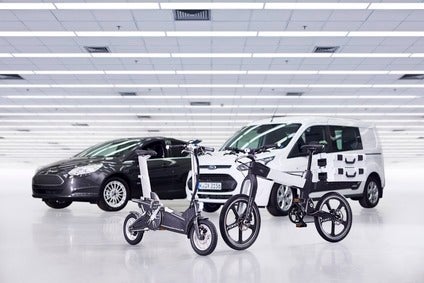
Ford is expanding its global Smart Mobility plan with a new experiment to study how electric bicycles can work seamlessly with cars and public transport to deliver faster and easier daily commutes and help businesses operating in urban centres.
The experiment called Handle on Mobility was detailed at the Mobile World Congress in Barcelona and marks the latest mobility project the company has announced worldwide this year.

Discover B2B Marketing That Performs
Combine business intelligence and editorial excellence to reach engaged professionals across 36 leading media platforms.
These experiments will help test transportation ideas for better customer experiences, more flexible user-ship models and social collaboration that can reward customers.
Traffic problems and overly-long commutes have a significant economic and social impact in large cities. According to the European Commission, congestion within the European Union costs about EUR100bn per year. A study by the UK Office of National Statistics shows that each minute added to a commute affects anxiety, happiness and general well-being.
Handle on Mobility
The Handle on Mobility experiment extends the range of transport solutions for a connected journey that is more efficient, safer, healthier, and enables journeys to be completed with less anxiety and stress.
As a starting point for the experiment, Ford challenged employees around the world to submit designs for e-bikes. The prototype MoDe:Me and MoDe:Pro e-bikes presented at Mobile World Congress are among the top designs from more than 100 submitted.
Both e-bikes are equipped with a 200 watt motor with 9 amp hour battery that provides electric pedal assist for speeds of up to 25 km/h. The prototype e-bikes offer technology inspired by the automotive industry including, for example, a rear-facing ultrasonic sensor. This enables a rider alert system that both warns the cyclist when a vehicle is overtaking, by vibrating both handlebars, and alerts motorists of the presence of the e-bike by illuminating handlebar lights.
The bikes, which fold easily into vehicles, meet the needs of different users:
The MoDe:Me e-bike – built with the help of bicycle manufacturer Dahon – is intended for urban commuters to keep moving in congested city traffic. It folds and stows easily, allowing commuters to park on the city outskirts, take the e-bike onto public transport and travel to the centre, then ride the e-bike to their destination
The MoDe:Pro e-bike – built by a Ford team – is intended for urban commercial use such as by couriers, electricians, and goods and delivery services. It is designed to stow safely into commercial vehicles which can act as carrier and support vehicle, and be combined with more than one e-bike
The prototype MoDe:Me and MoDe:Pro e-bikes work with a prototype app called MoDe:Link compatible with the iPhone 6. Real-time information from the app enables the e-bikes to deliver:
Navigation: Handle-bar grip vibrations let the rider know when to turn. Turn signals are triggered automatically for safety. The app can identify bike-friendly roads, hazards and alerts, and will be able to sense, and communicate with other vehicles
Multimodal navigation and smart routing: Integrates journey planning with personal vehicle and public transportation networks, which can be filtered by cost, time, and amount of biking. Map includes weather, parking costs, and charging stations
Speed and comfort: Electric pedal assist rate can be adjusted based on heart rate, No Sweatmode reduces the requirement to pedal, allowing riders to arrive fresh at their destination
SYNC compatibility: While the e-bike is stowed and charging inside the vehicle, Ford’s SYNC voice-activated connectivity system shows the app on the vehicle’s display
After users input a destination, the MoDe:Link app lists possible journeys and then provides step-by-step or turn-by-turn navigation. This might include driving to a train station, taking an e-bike onto the train, then riding the bike from the train stop to the final destination. The app also updates the route as circumstances change. For example, if a train service is cancelled, the app could recommend that a commuter drive instead.
Info Cycle experiment
Ford is showcasing for the first time in Europe the Info Cycle experiment, an open-source research initiative to gather information about how bikes are used in different urban areas. The project has been designed to enhance understanding of the biking ecosystem and to improve safety for cyclists, as well as exploring improved mapping, smart journey planning and community-based services. A sensor box on the frame gathers data such as wheel speed, acceleration, weather and altitude.
Global mobility projects
Ford first announced Ford Smart Mobility and an initial 25 experiments designed to anticipate what customers will want and need in tomorrow’s transportation ecosystem at the 2015 Consumer Electronics Show in Las Vegas in January. There are now experiments in Europe, North America, Asia, Africa, and South America.






